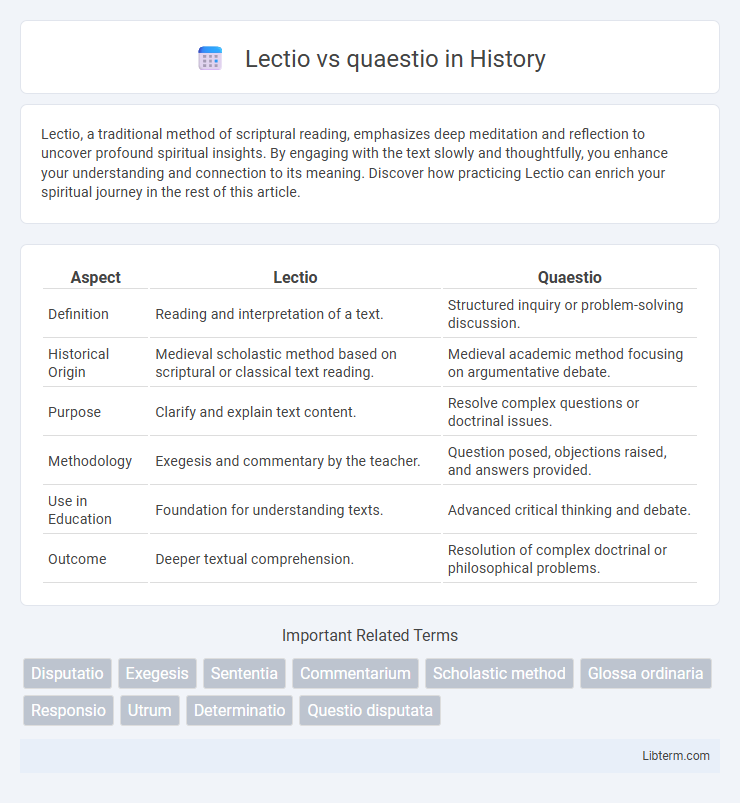Lectio, a traditional method of scriptural reading, emphasizes deep meditation and reflection to uncover profound spiritual insights. By engaging with the text slowly and thoughtfully, you enhance your understanding and connection to its meaning. Discover how practicing Lectio can enrich your spiritual journey in the rest of this article.
Table of Comparison
| Aspect | Lectio | Quaestio |
|---|---|---|
| Definition | Reading and interpretation of a text. | Structured inquiry or problem-solving discussion. |
| Historical Origin | Medieval scholastic method based on scriptural or classical text reading. | Medieval academic method focusing on argumentative debate. |
| Purpose | Clarify and explain text content. | Resolve complex questions or doctrinal issues. |
| Methodology | Exegesis and commentary by the teacher. | Question posed, objections raised, and answers provided. |
| Use in Education | Foundation for understanding texts. | Advanced critical thinking and debate. |
| Outcome | Deeper textual comprehension. | Resolution of complex doctrinal or philosophical problems. |
Introduction to Lectio and Quaestio
Lectio and Quaestio represent foundational methods in medieval scholasticism, where Lectio involves the careful reading and exposition of authoritative texts, emphasizing comprehension and interpretation. Quaestio follows as a dialectical process of posing questions and seeking solutions through structured debate and logical argumentation. These techniques collectively foster deep analytical skills and critical engagement with complex philosophical or theological doctrines.
Historical Background of Lectio and Quaestio
Lectio, originating in medieval monastic traditions, involved oral reading and detailed commentary on sacred texts to deepen theological understanding. Quaestio emerged in the scholastic period as a rigorous method of academic inquiry, structured around posing questions, debating various viewpoints, and arriving at reasoned conclusions. Both practices shaped medieval pedagogy by fostering critical analysis and interpretive skills central to university curricula.
Core Definitions: What is Lectio?
Lectio refers to the practice of reading or studying a text carefully, typically within classical education and medieval scholarship contexts. It emphasizes deep engagement with the original material to understand its meaning, language, and structure. This method contrasts with quaestio, which focuses on questioning and critical analysis to explore interpretations or resolve difficulties in the text.
Core Definitions: What is Quaestio?
Quaestio is a method of inquiry rooted in medieval scholastic tradition, designed to explore and resolve complex questions through systematic debate and argumentation. It involves posing a specific question, examining opposing viewpoints, and synthesizing conclusions based on critical analysis and textual evidence. Unlike lectio, which focuses on reading and interpreting texts, quaestio emphasizes dialectical reasoning and the rigorous examination of disputable issues.
Lectio: Structure and Methodology
Lectio, a fundamental practice in medieval scholasticism, emphasizes close reading and interpretation of authoritative texts, often the Bible or classical works, to extract layered meanings through methodical analysis. Its structured approach involves sequentially reading passages, highlighting key terms, and deploying rhetorical questions to explore theological or philosophical insights. This methodology fosters deep comprehension by encouraging careful consideration of textual nuances, contrasting with Quaestio's problem-focused, dialectical format centered on debate and resolving disputed points.
Quaestio: Structure and Methodology
Quaestio in medieval scholasticism follows a precise structure, beginning with a question posed for debate, followed by a systematic presentation of arguments for and against the proposition. The methodology employs dialectical reasoning, involving the citation of authoritative sources, the analysis of objections, and a synthesized resolution that reconciles conflicting viewpoints. This rigorous form of inquiry contrasts with Lectio's more expository approach, emphasizing critical engagement and analytical depth in theological and philosophical studies.
Key Differences Between Lectio and Quaestio
Lectio emphasizes direct reading and interpretation of authoritative texts, focusing on understanding established meanings. Quaestio involves critical questioning and debate to explore multiple perspectives and resolve uncertainties in the text. While Lectio prioritizes passive absorption, Quaestio promotes active inquiry and dialectical reasoning within medieval scholastic tradition.
Interplay Between Lectio and Quaestio in Scholastic Tradition
Lectio and quaestio represent foundational methods in the scholastic tradition, with lectio focusing on the careful reading and interpretation of authoritative texts, while quaestio drives critical inquiry through targeted questioning. The interplay between lectio and quaestio enables scholars to engage deeply with texts, using lectio to establish a grounded understanding that quaestio then interrogates to uncover nuanced meanings and resolve apparent contradictions. This dynamic method fosters rigorous intellectual discourse and propels theological and philosophical development within medieval universities.
Modern Applications of Lectio and Quaestio
Modern applications of Lectio emphasize reflective reading techniques in digital education platforms, enhancing critical engagement with texts through interactive annotation tools and multimedia resources. Quaestio, as a problem-based learning approach, is widely adopted in medical and legal fields to foster analytical reasoning by presenting real-world case studies and encouraging collaborative inquiry. Both methods integrate technology to support active learning, with Lectio promoting deep comprehension and Quaestio stimulating practical problem-solving skills.
Conclusion: The Lasting Impact of Lectio and Quaestio
Lectio and quaestio profoundly shaped medieval scholasticism, fostering critical thinking and textual analysis that underpin modern academic methods. Lectio emphasized rigorous reading and interpretation of authoritative texts, while quaestio promoted dialectical inquiry and systematic debate. Their combined legacy endures in contemporary education, enhancing critical reasoning and structured argumentation across disciplines.
Lectio Infographic

 libterm.com
libterm.com